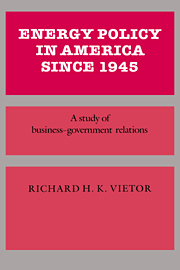Book contents
- Frontmatter
- Contents
- List of charts and figures
- List of tables
- Editors' preface
- Acknowledgments
- List of abbreviations
- 1 Introduction: The political economy of energy
- Part I The transition to peace and fluid fuels, 1945–1958
- Part II Managing surplus through the politics of stasis, 1959–1968
- Part III The second energy transition: adjustment to depletion, 1969–1980
- 9 Energy crisis and structural change
- 10 Equity versus efficiency: oil price controls
- 11 Natural gas: the dilemma of regulatory transition
- 12 Natural gas: the consequences of scarcity
- 13 National energy management
- 14 Business, government, and public policy
- Index
10 - Equity versus efficiency: oil price controls
Published online by Cambridge University Press: 13 October 2009
- Frontmatter
- Contents
- List of charts and figures
- List of tables
- Editors' preface
- Acknowledgments
- List of abbreviations
- 1 Introduction: The political economy of energy
- Part I The transition to peace and fluid fuels, 1945–1958
- Part II Managing surplus through the politics of stasis, 1959–1968
- Part III The second energy transition: adjustment to depletion, 1969–1980
- 9 Energy crisis and structural change
- 10 Equity versus efficiency: oil price controls
- 11 Natural gas: the dilemma of regulatory transition
- 12 Natural gas: the consequences of scarcity
- 13 National energy management
- 14 Business, government, and public policy
- Index
Summary
Federal regulation of petroleum prices was partly coincidence, partly an extension of previous policies, and mostly a frustrating adjustment to domestic depletion and the power of OPEC. Direct federal control of crude oil prices lasted just short of a decade, from August 1971 until January 1981. The price of petroleum products was also regulated for most of that time, and quantities were allocated right down to the level of retail distribution. Congress, the Executive Branch, and the courts devoted a ridiculous amount of time and political energy to the issue of price controls. The oil industry was deeply affected, from strategic planning to daily operations. American consumers benefited, in the short-run, from lower prices. But, over the long-run, they paid dearly through distorted markets, a less efficient industry, and still greater dependence on imported oil. Relations between business and government reached their nadir on the price control issue, and the policy process left the public with an abiding distrust of the industry and its regulators.
This chapter does not attempt to document the literally hundreds of oil price regulations and their implementation by the Federal Energy Administration (FEA). Nor does it provide economic analysis of their costs and benefits to the whole economy, or their microeconomic impact on the oil industry. The chapter largely disregards the immense structure of downstream price and product controls (such as refining, wholesale and retail distribution), except where it affected issues of crude-oil pricing. Even limited to crude-oil pricing, the story is complicated.
- Type
- Chapter
- Information
- Energy Policy in America since 1945A Study of Business-Government Relations, pp. 236 - 271Publisher: Cambridge University PressPrint publication year: 1984



